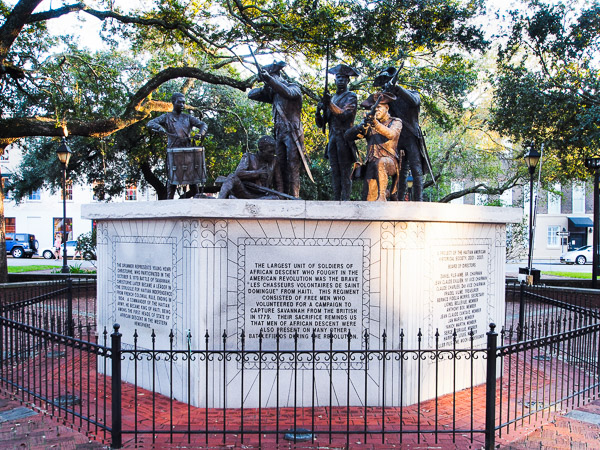 Chasseurs volontaires de Saint-Domingue
Chasseurs volontaires de Saint-Domingue
Chasseurs volontaires de Saint-Domingue
 Chasseurs volontaires de Saint-Domingue
Chasseurs volontaires de Saint-Domingue
Chasseurs volontaires de Saint-Domingue
Savannah, GA 31401
Chasseurs-Volontaires de Saint-Domingue Monument is a memorial honoring Haitian Volunteers who fought with Pulaski during the Siege of Savannah in 1779.
Chasseurs-Volontaires de Saint-Domingue was a group of white colonists and 800 native riflemen and slaves, from French colonial Saint-Domingue (present day Haiti), who participated in the War of American Independence in Savannah, Georgia.
]]>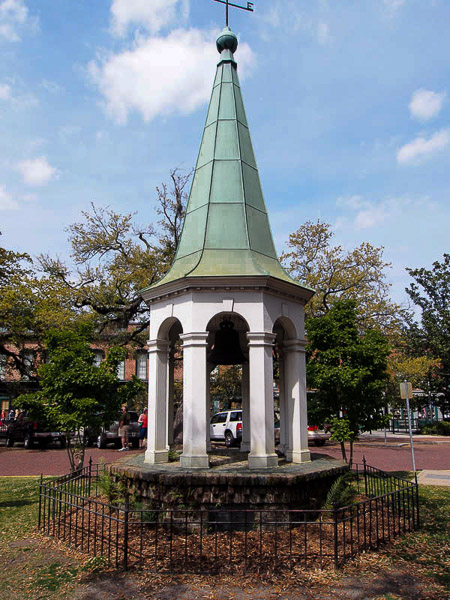 City Exchange Fire Bell Monument
City Exchange Fire Bell Monument
City Exchange Fire Bell Monument
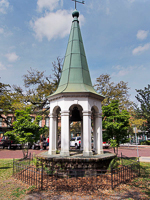 City Exchange Fire Bell Monument
City Exchange Fire Bell Monument
City Exchange Fire Bell Monument
Savannah, GA 31401
The City Exchange Fire Bell hung in the cupola of the City Exchange for 100 years until the building was torn down to make way for City Hall. The bell signaled the closing time for shops, served as a fire alarm, and was often used in celebrations and in tributes for fallen heroes.
]]>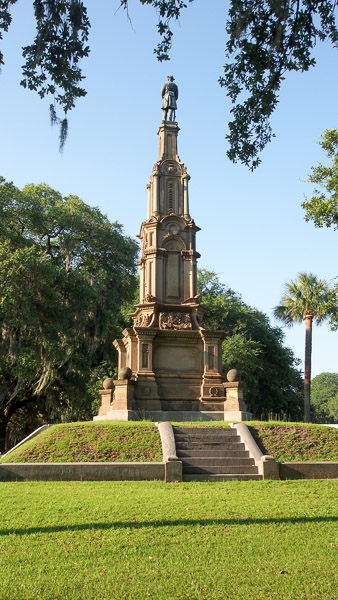 Confederate Monument
Confederate Monument
Confederate Monument
 Confederate Monument
Confederate Monument
Confederate Monument
Savannah, GA 31401
The Confederate Monument is one of the largest Confederate monuments and is located at the far end of Forsyth Park pass the fountain. This impressive monument honored local Civil War veterans as well as those who had lost their lives in the bloody conflict. The Confederate Monument was erected in Forsyth Park in 1879.
{jssocials}]]>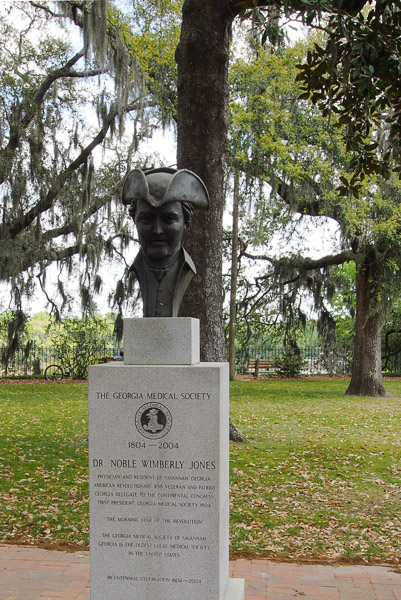 Dr. Noble Wimberly Jones Medical Monument
Dr. Noble Wimberly Jones Medical Monument
Dr. Noble Wimberly Jones Medical Monument
 Dr. Noble Wimberly Jones Medical Monument
Dr. Noble Wimberly Jones Medical Monument
Dr. Noble Wimberly Jones Medical Monument
Savannah, GA 31401
Noble Wimberly Jones, patriot, born near London, England, in 1724; died in Savannah, Georgia, 9 January, 1805. He was the son of Dr. Noble Jones, an early settler of Georgia. The son was associated with his father in the practice of medicine in Savannah from 1748 till 1756.
Noble W. Jones and his sister, Mary, were members of the first group of Georgia colonists. He was trained for a medical career by his father, who was also in government service. Like his father, Noble W. Jones accumulated thousands of acres of land, including his estate at Wormsloe, in the young colony. His planting interests, particularly in rice lands along the Ogeechee River, contributed considerably to his income.
]]>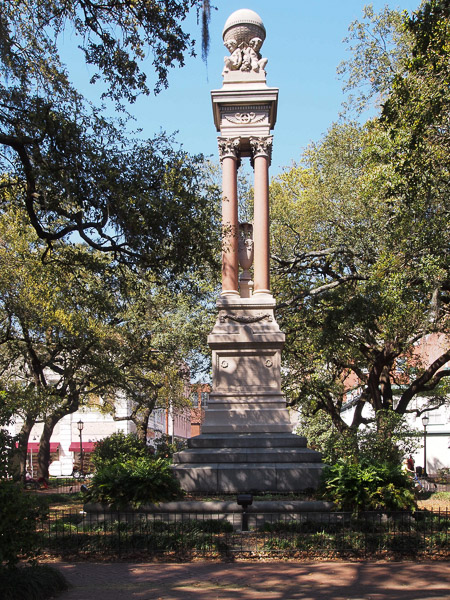 Gordon Monument
Gordon Monument
Gordon Monument
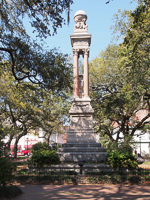 Gordon Monument
Gordon Monument
Gordon Monument
Savannah, GA 31401
The William Washington Gordon monument was erected in 1883 to honor the founder and president of Georgia’s first railroad, the Central Railroad and Banking Company. He is also known as the grandfather of Juliette Gordon Low, Founder of the Girl Scouts of America.
{jssocials}]]>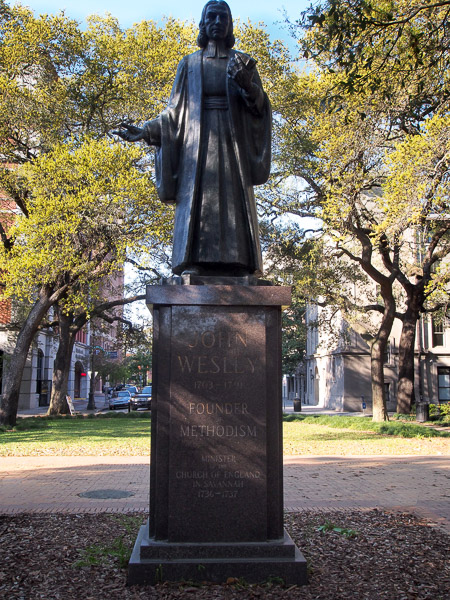 John Wesley Monument
John Wesley Monument
John Wesley Monument
 John Wesley Monument
John Wesley Monument
John Wesley Monument
Savannah, GA 31401
The John Wesley Monument stands in the center of Reynolds Square near the place where Wesley’s parish house once stood. He was the founder of Methodism in 1703-1791. The a bronze statue of John Wesley depicts him as a young man wearing his Church of England vestments. According to the sculptor, "The monument is as he looks up from his Bible toward his congregation, about to speak and stretching out his right hand in love, invitation and exhortation. In contrast, the hand holding the Bible is intense and powerful-the point of contact with the Almighty."
]]>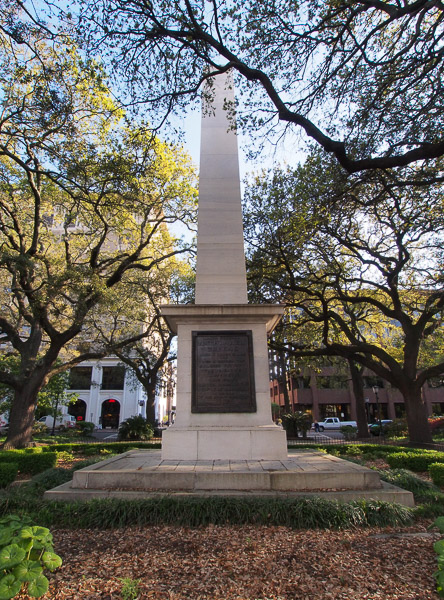 Nathanael Greene Monument
Nathanael Greene Monument
Nathanael Greene Monument
 Nathanael Greene Monument
Nathanael Greene Monument
Nathanael Greene Monument
Savannah, GA 31401
The Nathanael Greene monument on Johnson Square honors one of America’s top Revolutionary War officers. Brigadier General Nathanael Greene was second only to George Washington. Greene and Washington were the only two Continental generals that served throughout the entire American Revolution.
]]> Oglethorpe Monument
Oglethorpe Monument
Oglethorpe Monument
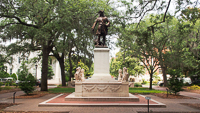 Oglethorpe Monument
Oglethorpe Monument
Oglethorpe Monument
Savannah, GA 31401
The James Oglethorpe monument is a 9-foot bronze statue. It was dedicated in 1910 to pay tribute to the founder of the Georgia Colony. The statue of Oglethorpe presides over Chippewa Square and faces the south so that he can keep a watchful eye on the Spanish threat from Florida.
]]>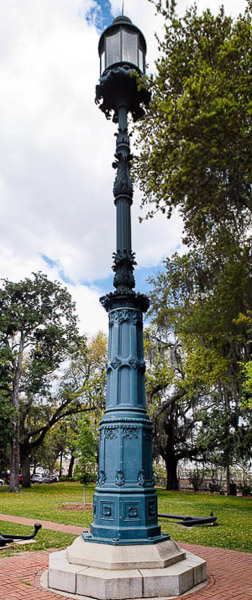 Old Harbor Light
Old Harbor Light
Old Harbor Light
 Old Harbor Light
Old Harbor Light
Old Harbor Light
Savannah, GA 31401
The Old Harbor Light was erected by the United States Lighthouse Board to guide ships into the Savannah Harbor and avoid the hulls of sunken ships in the channel. The British had sunk these ships in 1779 to prevent the French and American ships from entering Savannah during the Revolutionary War.
In October 1855, J.F. Gilmer, Captain of Engineers, sent the following to the Lighthouse Board recommending the erection of "a harbor beacon on 'the bay,' city of Savannah, as an aid to vessels approaching the city at night."
]]>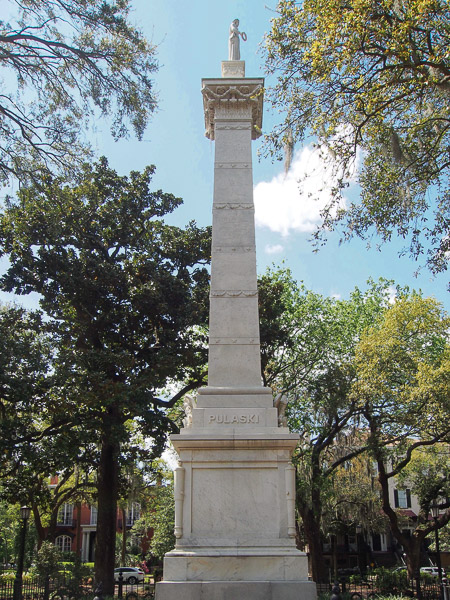 Pulaski Monument
Pulaski Monument
Pulaski Monument
 Pulaski Monument
Pulaski Monument
Pulaski Monument
Savannah, GA 31401
The Casimir Pulaski Monument is a tall statue of a wounded soldier which pays tribute to General Casimir Pulaski, a young Polish nobleman who fell as a hero during the American Revolution. The cornerstone of the Casimir Pulaski Monument was placed during ceremonies on the afternoon of Oct. 11, 1853.
]]>